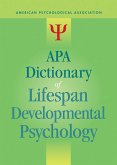Ellen A Skinner, Thomas Kindermann, Andrew Mashburn
Lifespan Developmental Systems
Meta-theory, Methodology and the Study of Applied Problems
Ellen A Skinner, Thomas Kindermann, Andrew Mashburn
Lifespan Developmental Systems
Meta-theory, Methodology and the Study of Applied Problems
- Gebundenes Buch
- Merkliste
- Auf die Merkliste
- Bewerten Bewerten
- Teilen
- Produkt teilen
- Produkterinnerung
- Produkterinnerung
This innovative textbook takes advanced undergraduate and graduate students "behind the curtain" of standard developmental science, so they can begin to appreciate the generative value and methodological challenges of a lifespan developmental systems perspective.
Andere Kunden interessierten sich auch für
![Why Won't My Teenager Talk to Me? Why Won't My Teenager Talk to Me?]() John ColemanWhy Won't My Teenager Talk to Me?192,99 €
John ColemanWhy Won't My Teenager Talk to Me?192,99 €![Intercultural Parenting Intercultural Parenting]() Koong Hean FooIntercultural Parenting181,99 €
Koong Hean FooIntercultural Parenting181,99 €![Theories of Human Development Theories of Human Development]() Barbara M. NewmanTheories of Human Development275,99 €
Barbara M. NewmanTheories of Human Development275,99 €![APA Dictionary of Lifespan Developmental Psychology APA Dictionary of Lifespan Developmental Psychology]() APA Dictionary of Lifespan Developmental Psychology35,99 €
APA Dictionary of Lifespan Developmental Psychology35,99 €![Why Siblings Matter Why Siblings Matter]() Naomi WhiteWhy Siblings Matter206,99 €
Naomi WhiteWhy Siblings Matter206,99 €![Children and Sexual-Based Online Harms Children and Sexual-Based Online Harms]() Catherine KnibbsChildren and Sexual-Based Online Harms181,99 €
Catherine KnibbsChildren and Sexual-Based Online Harms181,99 €![Experimental Study of the Emotional Sphere of Children, Adolescents and Early Adulthood in Ukraine Experimental Study of the Emotional Sphere of Children, Adolescents and Early Adulthood in Ukraine]() Oleksiy ChebykinExperimental Study of the Emotional Sphere of Children, Adolescents and Early Adulthood in Ukraine178,99 €
Oleksiy ChebykinExperimental Study of the Emotional Sphere of Children, Adolescents and Early Adulthood in Ukraine178,99 €-
-
-
This innovative textbook takes advanced undergraduate and graduate students "behind the curtain" of standard developmental science, so they can begin to appreciate the generative value and methodological challenges of a lifespan developmental systems perspective.
Hinweis: Dieser Artikel kann nur an eine deutsche Lieferadresse ausgeliefert werden.
Hinweis: Dieser Artikel kann nur an eine deutsche Lieferadresse ausgeliefert werden.
Produktdetails
- Produktdetails
- Verlag: Taylor & Francis Ltd (Sales)
- Seitenzahl: 390
- Erscheinungstermin: 23. Mai 2019
- Englisch
- Abmessung: 254mm x 178mm x 24mm
- Gewicht: 916g
- ISBN-13: 9781138316645
- ISBN-10: 1138316644
- Artikelnr.: 57061410
- Herstellerkennzeichnung
- Libri GmbH
- Europaallee 1
- 36244 Bad Hersfeld
- 06621 890
- Verlag: Taylor & Francis Ltd (Sales)
- Seitenzahl: 390
- Erscheinungstermin: 23. Mai 2019
- Englisch
- Abmessung: 254mm x 178mm x 24mm
- Gewicht: 916g
- ISBN-13: 9781138316645
- ISBN-10: 1138316644
- Artikelnr.: 57061410
- Herstellerkennzeichnung
- Libri GmbH
- Europaallee 1
- 36244 Bad Hersfeld
- 06621 890
Ellen A. Skinner, trained as a lifespan developmentalist, is a leading expert on the development of children's motivation, coping, and academic identity in school. She is a Professor of Human Development and Chair of the Psychology Department at Portland State University. Thomas A. Kindermann is a lifespan developmental psychologist and Professor in the Psychology Department at Portland State University. He is a leading expert on children's peer affiliations in school and how they can foster or undermine children's academic development. Andrew J. Mashburn, a Professor of Developmental Psychology at Portland State University, is a leading expert on the transition to kindergarten. He conducts research to describe, explain, and promote young children's school readiness and long-term academic success.
Preface: Welcome to the Journey
1 Getting Straight on the Goals of Developmental Science
LIFESPAN DEVELOPMENTAL SYSTEMS META-THEORIES
Section I: How Are Unexamined Assumptions Shaping Developmental Science?
2 "Understanding" Theories: Why It's Important and How to Do It
3 Dueling Theories of Attachment and Why They Are Fighting
4 Uncovering Assumptions We Hold about Human Development
5 Is Human Development a Tree, a Machine, a Butterfly, or a Dance?
6 Contrasting Meta-theories: Friends or Enemies?
Section II: How Can Contextual Approaches Enrich Our Understanding of
Development?
7 Lifespan Developmental Paradigm Shift: Developing People in Changing
Contexts
8 Ecological Revolutions: Alive and Well and Living in Multi-level
Partially Nested Contexts
9 The Bioecological Model Reinvented: Proximal Processes as the Engines of
Development
10 Transactional Dialectical Advice: Qualitative Shifts and the Ice Cream
Cone in a Can
Section III: What More Does a Lifespan Developmental Systems Perspective
Have to Offer?
11 Relational Developmental Systems Meta-theories: Walking with
Complementarities
12 Nonlinear Dynamic Systems Meta-theories: Much Convergence but Still
Feuding?
13 Putting It All Together I: The Big Developmental Systems Ideas of Levels
and Engines
14 Putting It All Together II: The Big Developmental Systems Idea of
Dynamics
LIFESPAN DEVELOPMENTAL SYSTEMS METHODOLOGIES
Section IV: What Tools Can We Use to Study Developmental Systems?
Description
15 The Assumptions in Your Hammer: How Meta-theories Shape Methods and Vice
Versa
16 Adding Development to Designs: Cross-sectional, Longitudinal, and
Cross-sequential Designs
17 Crossing Developmental Boundaries I: Sampling Equivalence and Selection
18 Crossing Developmental Boundaries II: Measurement Equivalence and
"Developmentally-friendly" Conceptualizations
Section V: What Tools Can We Use to Study Developmental Systems?
Explanation
19 Building a Time Machine I: Lab and Field Experimental Designs
20 Building a Time Machine II: Naturalistic Designs and Causal Inferences
21 Looking under the Hood I: Proximal Processes and Sequential Observations
22 Looking under the Hood II: Intra-individual Time Series, Episodes, and
Trajectories
23 Whole Persons in Complex Contexts: Person-centered Approaches
Section VI: What Tools Can We Use to Study Developmental Systems?
Optimization
24 Developing Contexts: Weather, Co-adaptation, and Attunement
25 Developing Brains: Experience and Neuroplasticity
26 Developing Individuals: Transformations and Branching Cascades
27 Multiple Lines of Sight: Converging Operations and Open Minds
Afterword: The Journey Continues
Index
1 Getting Straight on the Goals of Developmental Science
LIFESPAN DEVELOPMENTAL SYSTEMS META-THEORIES
Section I: How Are Unexamined Assumptions Shaping Developmental Science?
2 "Understanding" Theories: Why It's Important and How to Do It
3 Dueling Theories of Attachment and Why They Are Fighting
4 Uncovering Assumptions We Hold about Human Development
5 Is Human Development a Tree, a Machine, a Butterfly, or a Dance?
6 Contrasting Meta-theories: Friends or Enemies?
Section II: How Can Contextual Approaches Enrich Our Understanding of
Development?
7 Lifespan Developmental Paradigm Shift: Developing People in Changing
Contexts
8 Ecological Revolutions: Alive and Well and Living in Multi-level
Partially Nested Contexts
9 The Bioecological Model Reinvented: Proximal Processes as the Engines of
Development
10 Transactional Dialectical Advice: Qualitative Shifts and the Ice Cream
Cone in a Can
Section III: What More Does a Lifespan Developmental Systems Perspective
Have to Offer?
11 Relational Developmental Systems Meta-theories: Walking with
Complementarities
12 Nonlinear Dynamic Systems Meta-theories: Much Convergence but Still
Feuding?
13 Putting It All Together I: The Big Developmental Systems Ideas of Levels
and Engines
14 Putting It All Together II: The Big Developmental Systems Idea of
Dynamics
LIFESPAN DEVELOPMENTAL SYSTEMS METHODOLOGIES
Section IV: What Tools Can We Use to Study Developmental Systems?
Description
15 The Assumptions in Your Hammer: How Meta-theories Shape Methods and Vice
Versa
16 Adding Development to Designs: Cross-sectional, Longitudinal, and
Cross-sequential Designs
17 Crossing Developmental Boundaries I: Sampling Equivalence and Selection
18 Crossing Developmental Boundaries II: Measurement Equivalence and
"Developmentally-friendly" Conceptualizations
Section V: What Tools Can We Use to Study Developmental Systems?
Explanation
19 Building a Time Machine I: Lab and Field Experimental Designs
20 Building a Time Machine II: Naturalistic Designs and Causal Inferences
21 Looking under the Hood I: Proximal Processes and Sequential Observations
22 Looking under the Hood II: Intra-individual Time Series, Episodes, and
Trajectories
23 Whole Persons in Complex Contexts: Person-centered Approaches
Section VI: What Tools Can We Use to Study Developmental Systems?
Optimization
24 Developing Contexts: Weather, Co-adaptation, and Attunement
25 Developing Brains: Experience and Neuroplasticity
26 Developing Individuals: Transformations and Branching Cascades
27 Multiple Lines of Sight: Converging Operations and Open Minds
Afterword: The Journey Continues
Index
Preface: Welcome to the Journey
1 Getting Straight on the Goals of Developmental Science
LIFESPAN DEVELOPMENTAL SYSTEMS META-THEORIES
Section I: How Are Unexamined Assumptions Shaping Developmental Science?
2 "Understanding" Theories: Why It's Important and How to Do It
3 Dueling Theories of Attachment and Why They Are Fighting
4 Uncovering Assumptions We Hold about Human Development
5 Is Human Development a Tree, a Machine, a Butterfly, or a Dance?
6 Contrasting Meta-theories: Friends or Enemies?
Section II: How Can Contextual Approaches Enrich Our Understanding of
Development?
7 Lifespan Developmental Paradigm Shift: Developing People in Changing
Contexts
8 Ecological Revolutions: Alive and Well and Living in Multi-level
Partially Nested Contexts
9 The Bioecological Model Reinvented: Proximal Processes as the Engines of
Development
10 Transactional Dialectical Advice: Qualitative Shifts and the Ice Cream
Cone in a Can
Section III: What More Does a Lifespan Developmental Systems Perspective
Have to Offer?
11 Relational Developmental Systems Meta-theories: Walking with
Complementarities
12 Nonlinear Dynamic Systems Meta-theories: Much Convergence but Still
Feuding?
13 Putting It All Together I: The Big Developmental Systems Ideas of Levels
and Engines
14 Putting It All Together II: The Big Developmental Systems Idea of
Dynamics
LIFESPAN DEVELOPMENTAL SYSTEMS METHODOLOGIES
Section IV: What Tools Can We Use to Study Developmental Systems?
Description
15 The Assumptions in Your Hammer: How Meta-theories Shape Methods and Vice
Versa
16 Adding Development to Designs: Cross-sectional, Longitudinal, and
Cross-sequential Designs
17 Crossing Developmental Boundaries I: Sampling Equivalence and Selection
18 Crossing Developmental Boundaries II: Measurement Equivalence and
"Developmentally-friendly" Conceptualizations
Section V: What Tools Can We Use to Study Developmental Systems?
Explanation
19 Building a Time Machine I: Lab and Field Experimental Designs
20 Building a Time Machine II: Naturalistic Designs and Causal Inferences
21 Looking under the Hood I: Proximal Processes and Sequential Observations
22 Looking under the Hood II: Intra-individual Time Series, Episodes, and
Trajectories
23 Whole Persons in Complex Contexts: Person-centered Approaches
Section VI: What Tools Can We Use to Study Developmental Systems?
Optimization
24 Developing Contexts: Weather, Co-adaptation, and Attunement
25 Developing Brains: Experience and Neuroplasticity
26 Developing Individuals: Transformations and Branching Cascades
27 Multiple Lines of Sight: Converging Operations and Open Minds
Afterword: The Journey Continues
Index
1 Getting Straight on the Goals of Developmental Science
LIFESPAN DEVELOPMENTAL SYSTEMS META-THEORIES
Section I: How Are Unexamined Assumptions Shaping Developmental Science?
2 "Understanding" Theories: Why It's Important and How to Do It
3 Dueling Theories of Attachment and Why They Are Fighting
4 Uncovering Assumptions We Hold about Human Development
5 Is Human Development a Tree, a Machine, a Butterfly, or a Dance?
6 Contrasting Meta-theories: Friends or Enemies?
Section II: How Can Contextual Approaches Enrich Our Understanding of
Development?
7 Lifespan Developmental Paradigm Shift: Developing People in Changing
Contexts
8 Ecological Revolutions: Alive and Well and Living in Multi-level
Partially Nested Contexts
9 The Bioecological Model Reinvented: Proximal Processes as the Engines of
Development
10 Transactional Dialectical Advice: Qualitative Shifts and the Ice Cream
Cone in a Can
Section III: What More Does a Lifespan Developmental Systems Perspective
Have to Offer?
11 Relational Developmental Systems Meta-theories: Walking with
Complementarities
12 Nonlinear Dynamic Systems Meta-theories: Much Convergence but Still
Feuding?
13 Putting It All Together I: The Big Developmental Systems Ideas of Levels
and Engines
14 Putting It All Together II: The Big Developmental Systems Idea of
Dynamics
LIFESPAN DEVELOPMENTAL SYSTEMS METHODOLOGIES
Section IV: What Tools Can We Use to Study Developmental Systems?
Description
15 The Assumptions in Your Hammer: How Meta-theories Shape Methods and Vice
Versa
16 Adding Development to Designs: Cross-sectional, Longitudinal, and
Cross-sequential Designs
17 Crossing Developmental Boundaries I: Sampling Equivalence and Selection
18 Crossing Developmental Boundaries II: Measurement Equivalence and
"Developmentally-friendly" Conceptualizations
Section V: What Tools Can We Use to Study Developmental Systems?
Explanation
19 Building a Time Machine I: Lab and Field Experimental Designs
20 Building a Time Machine II: Naturalistic Designs and Causal Inferences
21 Looking under the Hood I: Proximal Processes and Sequential Observations
22 Looking under the Hood II: Intra-individual Time Series, Episodes, and
Trajectories
23 Whole Persons in Complex Contexts: Person-centered Approaches
Section VI: What Tools Can We Use to Study Developmental Systems?
Optimization
24 Developing Contexts: Weather, Co-adaptation, and Attunement
25 Developing Brains: Experience and Neuroplasticity
26 Developing Individuals: Transformations and Branching Cascades
27 Multiple Lines of Sight: Converging Operations and Open Minds
Afterword: The Journey Continues
Index








